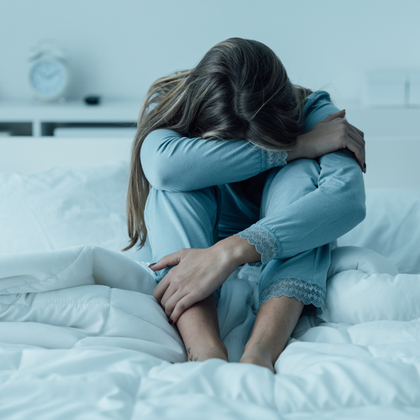Depression is a common mental disorder that affects people of all ages. According to the National Institute of Health and Care Excellence (NICE), one in 20 adults experiences an episode of depression each year, with one in four women and one in 10 men having an episode of depression at some point in their lives that’s serious enough to require treatment (i). Even the young can be affected, says the NHS, with about four percent of children aged five to 16 in the UK thought to show symptoms of anxiety or depression (ii).

Some people, however, may be more likely to develop depression than others. For instance, the NHS claims having certain personality traits – such as low self-esteem or being overly self-critical – can also make you more prone to depression (iii). Indeed, most people feel fed up or low from time to time, especially when things aren’t going well. But often these feeling disappear after a few days. Depression, on the other hand, is when you feel low for a few weeks or even months, when the feelings keep coming back again and again, or when the way you feel affects your day-to-day life.
Health issues
Unfortunately, depression doesn’t come on its own. According to experts at the Royal College of Psychiatrists, people with two or more chronic physical health problems are almost seven times more likely to experience depression than those without health conditions, with rates of depression double in those with diabetes, high blood pressure, heart failure and coronary artery disease (iv).
If you have a mental health disorder, you’re also more likely to smoke. In some parts of England, for example, more than half of people with serious mental illness smoke, which is nearly three times the rate of the general population (v).
Meanwhile, many things can cause depression, such as stress, illness or lifestyle changes such as bereavement, divorce, separation, redundancy or a family history of mental health problems. Though sometimes it can happen for no obvious reason.
Signs to look out for
There are many symptoms of depression, and they vary from one person to the next. Here are some of the main signs to look out for:
-
Lack of energy or feeling tired all the time
-
Restlessness and agitation
-
Having difficulty sleeping (or sleeping more than usual)
-
Poor appetite, which may lead to weight loss
-
Lack of interest in sex
-
Feeling sad and in low spirits all the time
-
Not finding any pleasure in life
-
Having difficulty making decisions
-
Low self-confidence and self-esteem, withdrawing from family and friends
- Feeling generally helpless and hopeless
If you’ve been having one or more of these symptoms for a few weeks or more, make an appointment to see your GP.
What is CBT?
If your GP believes you’re suffering from depression you may be prescribed antidepressant drugs, which are believed to help around two-thirds of people with moderate to severe depression.
However, according to the NHS, self-help and talking therapies are among the treatments recommended for mild and moderate depression (vi). Currently one of the most popular self-help and talking therapies is Cognitive Behavioural Therapy (CBT). CBT is a type of talking therapy that combines cognitive therapy and behaviour therapy. If you're affected by negative patterns of thinking or behaviour, CBT aims to change the way you feel and break those patterns – which can make you feel and act more positively.
The Royal College of Psychiatrists claims CBT has been shown to help with depression, along with other mental health problems such as anxiety, stress ,bipolar disorder, phobias and obsessive-compulsive disorder (OCD). The mental health charity Mind also claims CBT may be effective for mood swings, phobias, sleep problems and even the management of chronic pain and general health problems (viii).
How does it work?
During a CBT session, you’ll usually talk to a therapist to identify your issues and create a structured plan for achieving your goals. These sessions usually involve just you and your therapist. However, group sessions are often effective too, as are self-learning CBT programmes that you can complete online or by using interactive CDs. Self-help books that teach CBT techniques can also be very useful.
How can you access CBT?
If you’d like to find out more about accessing one-to-one CBT, speak to your GP. The NHS offers CBT as part of a government-funded programme called Improved Access to Psychological Therapies (IAPT), with some therapists operating out of general practices and others working as part of community mental health teams. You can also refer yourself directly to an IAPT therapist – find one in your area on the NHS Website.
If, on the other hand, you live in an area where the IAPT programme doesn’t have a widespread service, you can find a private CBT therapist via the British Association of Behavioural and Cognitive Psychotherapies website.
Meanwhile, you can learn cognitive behavioural therapy skills online for free via the MoodGYM training programme. Alternatively, try browsing the recommended CBT self-help books and CDs at the Overcoming website, or ask about suitable titles at your local bookshop or library.
For relieving depression, there are lots of things you can do yourself that may help you cope with your feelings, including the following:
Get some exercise
There’s plenty of evidence to suggest being physically active may help lift your mood, especially if you have mild depression. Indeed, according to the NHS, there’s evidence that exercise can help depression and it’s one of the main treatments for mild depression (vi). That may be because physical activity stimulates your brain to produce feel-good hormones. Most types of exercise will be beneficial, whether it's walking, cycling, swimming, doing yoga or Pilates, or working out to a fitness DVD. Even doing some housework and gardening may help.
Watch your alcohol intake
When you feel down, it may feel natural to have a drink to lift your spirits. However, alcohol is believed to make depression worse. The Royal College of Psychiatrists suggests alcohol affects the chemistry of the brain, which increases the risk of depression (ix). That’s why it’s important to avoid drinking more than the government’s maximum alcohol recommendations, which state you should aim to drink no more than 14 units of alcohol a week, spread out evenly over at least three days (one unit equals half a pint of beer, a small glass of wine or a single shot of spirits).
Get into a routine
Low mood and depression can affect your daily routine because you may be staying up late and not sleeping very well, for instance, or you may be skipping meals because you don’t feel like eating. But straying from your usual routine make you feel worse, so try to stick to your normal meal and bed times whenever possible.
Try to be positive
If your mood is low, you’ll probably see everything in a negative light. But thinking more positively may help you to see your situation from a more constructive viewpoint. Surround yourself whenever possible with people who have a positive outlook, and try to notice the things that go well, rather than the things that go badly. Even if you’re a born pessimist, you can learn to be more positive. For example, at the end of every day make a list of three positive things that happened or three things you’re grateful for.
Soak up some sunlight
Some people find they feel more depressed during the winter months than in the summer, which experts believe is caused by a lack of sunlight (read our guide to seasonal affective disorder to learn more about this). So during the winter, get outdoors as often as possible in the daytime, especially during a bright, crisp day.
Talk about it
If you have friends and family you can confide in, tell them about your feelings and why you’re finding life a little harder than usual. Most people are more than happy to listen to those they care about, and you may even find that they’ve had similar feelings too.
If you don’t have anyone to talk to – or anyone you feel you can confide in – ask your GP about counselling. Many doctors’ surgeries have counselling services these days. Alternatively, you could contact your local branch of Mind, the mental health charity, as many offer counselling services.
Food mood boosters
If you feel depressed, it can affect your appetite and you may not feel like eating. Eating well, however, is important for maintaining your general health. So try to have three meals every day, including breakfast.
You may well feel like eating unhealthy foods when you feel low, but comfort eating doesn’t help in the long run. So try to eat as healthily as possible, including five or more portions of fruit and vegetables every day, plus have some protein at each meal too. And remember to drink plenty of fluids, as being even mildly dehydrated may affect your mood.
What you eat may affect the way you feel too, says the charity Mind (x). For instance, it’s widely thought that changes in blood sugar levels can affect mood and energy levels, while some of the foods you eat may affect your brain’s production of mood-altering chemicals such as serotonin and dopamine.
So to help boost your mood, try the following:
Get your five a day
Eating five portions of fruit and vegetables every day helps to make sure you're getting the nutrients your body needs, which will also support your emotional health.
Go for slow carbohydrates
If your energy level is low, your mood may often follow. That's why it may be important to eat foods that release their energy slowly. Slow-release foods include unrefined carbohydrates such as whole grains (oats, brown and wild rice, barley, corn, quinoa, rye and whole wheat).
Fill up on fish
The omega-3 fatty acids found in oily fish are thought to be important for healthy brain functioning, as well as a range of other health benefits. According to the NHS, a healthy diet should include at least two portions of fish a week, one portion of which should be oily fish (though women of childbearing age should eat no more than two portions of oily fish a week)(xi).
You can get the omega-3 fatty acids you need by eating oily fish, such as salmon, fresh tuna, trout, mackerel, pilchards and sardines. Omega-3 oils are also found in vegetarian foods such as rapeseed oil, flaxseed oil, soya oil and soya-based foods, many nuts and seeds, and omega-3 fortified eggs.
-
Have a banana
Certain foods are believed to help boost the body’s production of the feel-good chemical serotonin. That’s because they contain an amino acid called tryptophan, which is converted into serotonin in your brain. These foods include bananas, turkey, chicken, fish, cottage cheese, eggs, nuts, wheat germ, avocados, milk, cheese and pulses. -
Go easy on caffeine
According to Mind, caffeine is arguably the most widely used behaviour-modifying drug in use worldwide. But while a strong cup of coffee may give you a boost – which can be helpful in certain situations – drinking too caffeine much may cause symptoms such as anxiety, nervousness and depression. But while getting a bit of a boost can be helpful in certain situations, according to Mind drinking caffeine can also make you feel anxious and depressed (x).
Caffeine is also found in tea, chocolate and some fizzy soft drinks. So if you suffer from low mood it's a good idea to switch to decaffeinated and non-caffeinated varieties (or at least try to limit yourself to one or two cups of caffeinated drinks a day).
Natural remedies for low mood
There are several natural remedies designed to treat low mood, including the following:
St John’s Wort
A traditional herbal remedy used for low mood and mild anxiety, St John's Wort also has strong scientific evidence behind it to support these claims. Many studies involving thousands of volunteers suggest not only that St John’s Wort may be more effective than placebo in treating mild to moderate depression (xii), but others also claim the herb is as effective – at least – as conventional antidepressants (xiii). An updated systematic review of herbal medicines studied in several mental health disorders including depression also suggests there’s high-quality evidence for the use of St John’s wort for major depressive disorder (xiv).
However, St John’s Wort may interact with other conventional medicines, so speak to your GP before taking it if you’re on any kind of medication, including the oral contraceptive pill, tricyclic antidepressants, statins or warfarin.
5-HTP
Many conventional antidepressant medicines work by increasing serotonin levels in the brain. The non-essential amino acid 5-hydroxytryptophan (5-HTP) is a natural compound that’s converted in the brain to serotonin, which may explain why it’s been studied as a natural remedy for depression and low mood. Indeed, there are studies that suggest it may be as effective as some standard antidepressants (xv).
Fish Oils
The omega-3 fatty acids EPA and DHA found in oily fish have been studied extensively in relation to a wide range of health problems. However, one of the areas they have shown a lot of promise in is that of treating depression.
For example, one particular study involved older women suffering from depression. After taking high doses of EPA and DHA for eight weeks, their symptoms of depression had improved significantly compared to other women who received a placebo (xvi). Other studies have investigated the benefits of EPA in treating depression, with many suggesting it may be helpful (xvii).
High-Strength Multivitamin and Mineral
Since low levels of certain nutrients have been linked with symptoms of depression, taking a high-strength multivitamin and mineral with good amount of B vitamins, zinc and vitamin D may also help.
Living with depression can have its difficulties, but we hope these steps help make it a little easier. For even more articles on a range of common health conditions, visit our health library.
References:
-
Available online: https://cks.nice.org.uk/depression#!backgroundSub:1
-
Available online: https://www.nhs.uk/conditions/clinical-depression/
-
Available online: https://www.nhs.uk/conditions/clinical-depression/causes/
-
Available online: https://www.rcpsych.ac.uk/pdf/PS04_2010.pdf
-
Available online: https://ash.org.uk/media-and-news/press-releases-media-and-news/high-rates-of-smoking-among-people-with-serious-mental-health-conditions/
-
Available online: https://www.nhs.uk/conditions/clinical-depression/treatment/
-
Available online: https://www.rcpsych.ac.uk/mental-health/treatments-and-wellbeing/cognitive-behavioural-therapy-(cbt)
-
Available online: https://www.mind.org.uk/media/17708241/cbt-2017.pdf
-
Available online: https://www.rcpsych.ac.uk/mental-health/problems-disorders/alcohol-and-depression
-
Available online: https://www.mind.org.uk/information-support/tips-for-everyday-living/food-and-mood/#.XdazD5P7R28
-
Available online: https://www.nhs.uk/live-well/eat-well/fish-and-shellfish-nutrition/
-
Kasper. S, Anghelescu. I, Szegedi. A, et al. Superior efficacy of St Johns wort extract WS® 5570 compared to placebo in patients with major depression: a randomized, double-blind, placebo-controlled, multi-center trial. BMC Med. 2006 Jun 23.
-
Singer. A, Schmidt. M, Hauke. W, Stade. K. Duration of response after treatment of mild to moderate depression with Hypericum extract STW 3-VI, citalopram and placebo: a reanalysis of data from a controlled clinical trial. Phytomedicine. 2011;18(8-9):739-742.
-
Sarris J. et al., Herbal medicines in the treatment of psychiatric disorders: 10-year updated review. Phytother Res. 2018 Jul;32(7):1147-1162. Available online: https://www.ncbi.nlm.nih.gov/pubmed/29575228
-
Byerley. WF, Judd. LL, Reimherr. FW, et al. 5-hydroxytryptophan: a review of its antidepressant efficacy and adverse effects. J Clin Psychopharmacol. 1987;7:127-137.
Poldinger. W, Calanchini. B, Schwarz. WM. A functional-dimensional approach to depression: Serotonin deficiency as a target syndrome in a comparison of 5-hydroxytryptophan and fluvoxamine. Psychopathology. 1991;24:53-81. -
Rondanelli. M, Giacosa. A, et al. Effect of omega-3 fatty acids supplementation on depressive symptoms and on health-related quality of life in the treatment of elderly women with depression: a double-blind, placebo-controlled, randomized clinical trial. J Am Coll Nutr. 2010 Feb;29(1):55-64.
-
Jazayeri. S, Tehrani-Doost. M, Keshavarz. SA, et al. Comparison of therapeutic effects of omega-3 fatty acid eicosapentaenoic acid and fluoxetine, separately and in combination, in major depressive disorder. Aust N Z J Psychiatry. 2008;42:192-198.
Rogers. PJ, Appleton. KM, Kessler. D, et al. No effect of n-3 long-chain polyunsaturated fatty acid (EPA and DHA) supplementation on depressed mood and cognitive function: a randomised controlled trial. Br J Nutr. 2007 Oct 24.
Related Posts
Disclaimer: The information presented by Nature's Best is for informational purposes only. It is based on scientific studies (human, animal, or in vitro), clinical experience, or traditional usage as cited in each article. The results reported may not necessarily occur in all individuals. Self-treatment is not recommended for life-threatening conditions that require medical treatment under a doctor's care. For many of the conditions discussed, treatment with prescription or over the counter medication is also available. Consult your doctor, practitioner, and/or pharmacist for any health problem and before using any supplements or before making any changes in prescribed medications.

Christine
Christine Morgan has been a freelance health and wellbeing journalist for almost 20 years, having written for numerous publications including the Daily Mirror, S Magazine, Top Sante, Healthy, Woman & Home, Zest, Allergy, Healthy Times and Pregnancy & Birth; she has also edited several titles such as Women’ Health, Shine’s Real Health & Beauty and All About Health.
View More



